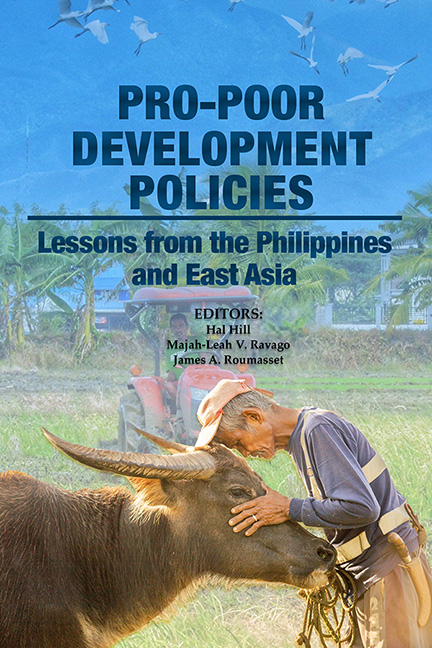Book contents
- Frontmatter
- Dedication
- Contents
- Figures, Tables and Boxes
- Foreword
- Foreword
- Message
- Preface and Acknowledgements
- About the Editors
- About the Contributors
- Acronyms
- Part 1 Introduction and Synthesis
- Part 2 Agricultural and Economic Development
- Part 3 Economic Policies for Achieving Targeted Levels of Living in the Philippines
- Part 4 Inequality and Economic Development
- Part 5 Competition Law and Policy
- Part 6 International Dimensions
- Index
6 - The Changing Relationship between Farm Size and Productivity: Asia and the Philippines
Published online by Cambridge University Press: 09 January 2024
- Frontmatter
- Dedication
- Contents
- Figures, Tables and Boxes
- Foreword
- Foreword
- Message
- Preface and Acknowledgements
- About the Editors
- About the Contributors
- Acronyms
- Part 1 Introduction and Synthesis
- Part 2 Agricultural and Economic Development
- Part 3 Economic Policies for Achieving Targeted Levels of Living in the Philippines
- Part 4 Inequality and Economic Development
- Part 5 Competition Law and Policy
- Part 6 International Dimensions
- Index
Summary
INTRODUCTION
No controversy in the history of agricultural economics has been more perennial than the relationship between farm size and productivity. From the days of Chayanov (1926) to the present, the dominant view has been the inverse relationship (IR) between farm size and productivity, particularly when productivity is measured by physical yield or gross value of production per hectare (e.g., Barrett, Bellemare, and Hou 2010; Larson et al. 2014; Delvaux, Riesgo, and Paloma 2020). Feder (1985) theoretically demonstrates that large farms tend to be less productive than small farms because they tend to use hired labour more intensively than small farms, and because hired workers do not work as hard as family workers. Based on this IR, Lipton (2012) advocates redistributive land reform as it is supposed to be conducive to both efficiency and equity.
However, Otsuka (2007) argues that the IR is partly a consequence of land reform programmes that suppress land rental transactions between less productive large farmers and more productive small farmers. He points out that the IR is found primarily in South Asia, where land reform programmes were widely implemented, but not in Southeast Asia, where they were not implemented rigorously, except in the Philippines. Otsuka (2013), Estudillo and Otsuka (2016) and Otsuka, Liu, and Yamauchi (2016a) also maintain that by nature, small farms in Asia employ labour-intensive production methods. Since the wage rate has been rising sharply in many high-performing Asian countries, the production cost of small-scale farming has been increasing also. This has resulted in agriculture’s loss of comparative advantage in this region. This argument suggests that the IR has been weakened in Asia because small farms’ labour-intensive production is no longer advantageous. Using cross-country data from 1980 to 2010, Otsuka, Liu, and Yamauchi (2013) confirm the decline in the efficiency of smallholder agriculture. Thus, Asia as a whole may become a major importer of food grains unless farm-size expansion and large-scale mechanization take place (Yamauchi, Huang, and Otsuka, 2021).
A recent meta-regression analysis of roughly 1,000 cases by Delvaux, Riesgo, and Paloma (2020) shows the following results: (1) a strong IR tends to be found when gross value of output per hectare or physical yield is used to measure productivity;
- Type
- Chapter
- Information
- Pro-poor Development PoliciesLessons from the Philippines and East Asia, pp. 133 - 156Publisher: ISEAS–Yusof Ishak InstitutePrint publication year: 2022



